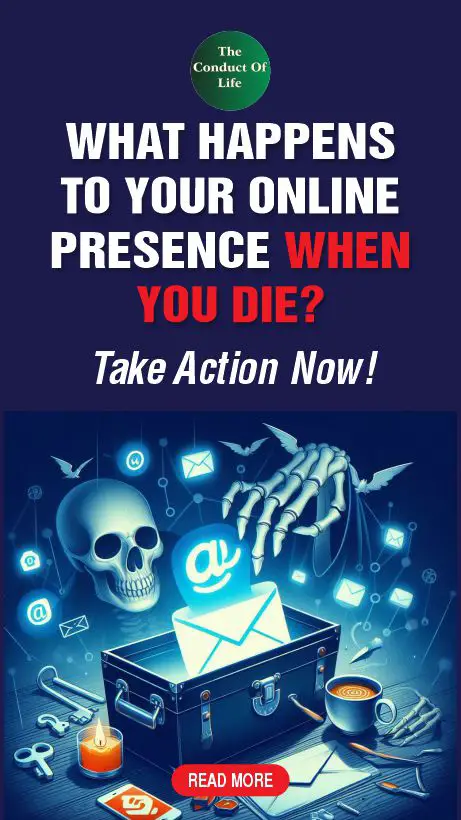Your digital legacy lives on after you. Learn why it matters, who controls it, and how to protect your online presence.
What happens to your online accounts, messages, and memories when you’re gone?
If you don’t plan, others might struggle to access important information or risk losing it forever.
Who will handle your data? Will your accounts be deleted or memorialized?
These questions matter more than ever.
Managing your digital footprint ensures your wishes are followed and protects your identity from misuse.
Whether it’s setting up a digital will or assigning account access, taking action now puts you in control.
Let’s explore how to manage your digital legacy effectively.
Recommended: What is Legacy and Impact?
Key Takeaways:
- A digital legacy plan protects your memories, ensuring photos and messages stay accessible to loved ones.
- Managing online accounts prevents identity theft and unauthorized access to sensitive information after you’re gone.
- Digital legacy planning allows loved ones to access financial resources, like online banking or cryptocurrencies.
- Clear instructions for social media and email accounts reduce stress and confusion for family members.

What is Digital Legacy?
Your digital legacy is everything you leave behind online, when you are gone, including social media accounts, emails, cloud storage, and digital assets. When you pass away, these accounts don’t simply vanish.
Someone must decide what happens to them. Will your photos remain accessible?
Will your social media profiles be memorialized or deleted? Without a plan, your digital footprint could be lost, misused, or locked away forever.
Why Digital Legacy Matters
Think about how much of your life exists online. Your conversations, documents, and memories are stored on various platforms.
If no one has access, your loved ones may struggle to retrieve important files or close your accounts.
Worse, hackers could exploit inactive profiles, leading to identity theft or fraud.
Here is the importance of digital legacy:
- Protects Personal Memories – Ensures your photos, messages, and digital content remain accessible to loved ones, preserving your story for future generations.
- Prevents Identity Theft: Inactive accounts are targets for hackers; a digital legacy plan helps secure your online identity and prevent misuse.
- Allows Financial Access: Digital assets like cryptocurrencies and online banking require proper planning to ensure rightful heirs can access and manage them.
- Respect Final Wishes: Gives you control over how your online presence is handled, memorialized, deleted, or passed to a trusted person.
- Eases Burden on Loved Ones: Simplifies account management for family members, preventing stress and confusion during an already difficult time.
Planning your digital legacy gives you control over who manages your online presence after you’re gone.
Related Posts
The Relationship between Life and Technology
How to Build a Lasting Individual Legacy
Creating Cultural Legacy that Endures
How to Craft a Lasting Family Heritage
Yes! Your Legacy and Impact Needs Measurement
Types of Digital Assets

Your digital footprint is more than just a collection of online accounts.
It includes everything from social media to financial records, shaping the legacy you leave behind.
Knowing what these assets are can help you decide how they should be handled after you’re gone.
Social Media Accounts
Your social media profiles hold memories, conversations, and personal interactions.
Platforms like Facebook, Instagram, and Twitter store years of posts, photos, and messages.
Without a plan, these accounts could remain inactive, be misused, or disappear.
Deciding whether to delete or memorialize them ensures your digital presence is managed according to your wishes.
Email Accounts
Your email inbox is more than a messaging tool; it holds financial records, business communications, and personal exchanges.
Services like Gmail and Outlook often contain sensitive data, including bank statements, contracts, and subscription details.
Without access, loved ones may struggle to manage your affairs or close accounts linked to your email.
Cloud Storage and Digital Files
Google Drive, Dropbox, and other cloud services store essential documents, photos, and videos.
These platforms keep everything from work projects to personal journals, making them an important part of your digital legacy.
If no one has access, valuable files may be lost forever.
Cryptocurrency and Online Banking
If you own Bitcoin, Ethereum, or other digital currencies, securing access is crucial.
Unlike traditional bank accounts, cryptocurrencies operate without a central authority, making them impossible to recover without proper credentials.
Online banking, investment portfolios, and payment platforms like PayPal also need planning to ensure funds reach the right people.
Subscription and E-Commerce Accounts
Streaming services, shopping accounts, and online memberships often hold payment details and personal information.
Accounts on platforms like Amazon, Netflix, and Spotify may continue billing after you’re gone.
Assigning someone to manage or close these accounts can prevent unnecessary charges and protect your data.
Planning for these assets now can prevent confusion later. By organizing your digital accounts, you give loved ones clear instructions and peace of mind.
Managing Your Digital Legacy: Why It Matters and How to Take Action

In today’s digital world, you likely have an array of online accounts, from social media profiles to email accounts, and personal files stored in the cloud.
Have you ever thought about what will happen to these digital assets after you’re gone?
This is where digital legacy management comes into play. It’s about deciding what happens to your online presence and data after your death, ensuring that your wishes are respected as reiterated by VPNOverveiew.
Understanding Your Digital Assets
Your digital legacy includes anything stored online, photos, social media accounts, email, documents, and even digital subscriptions.
It’s important to take time to evaluate what you have and think about how you want it managed.
Do you want loved ones to inherit your accounts, or would you prefer to have everything erased?
Managing Your Digital Legacy: What Are Your Options?
There are a few common ways to handle your digital legacy:
- Transferring Ownership: You may want to pass on your accounts and files to family or friends. Some platforms allow for transferring ownership, making sure those you trust have access.
- Deleting Everything: If you prefer privacy and simplicity, you can opt to have your online presence removed after you pass. Many services provide a way to delete your accounts or even set up automatic deletion instructions.
Digital Legacy Services: A Helping Hand
Many services now exist to assist with managing your digital legacy. These platforms offer tools to organize your digital estate, including password management and setting instructions for your digital executor.
They can help you create a plan that reflects your values, making it easier to hand over control to someone you trust.
Communicating Your Wishes
It’s not enough to make a plan, you also need to make sure your family knows what to do when the time comes.
Share the details of your plan, including passwords or who’s responsible for handling your digital accounts.
Appoint a digital executor to carry out your wishes, and ensure your family understands what’s involved.
Taking these steps will make things easier for them, reducing confusion and stress.
Why It’s Important
Managing your digital legacy is about more than protecting your personal information; it’s also about preserving memories.
Digital photos, videos, and social media interactions are powerful ways to keep your relationships alive, even after you’re gone.
By planning, you ensure that your digital footprint is handled in a way that’s meaningful to you.
Recommended: Legacy Leadership for Leadership Legacy
Managing Your Social Media Accounts After You’re Gone

Social media has become a key part of how we express ourselves and connect with others. But have you thought about what happens to your accounts once you’re no longer around?
These accounts hold not only memories but also moments that matter to your friends and family.
It’s important to consider how they’ll be handled after your death.
What Happens to Your Social Media Accounts?
Your social media presence doesn’t disappear when you pass away. Instead, it can impact those you leave behind, especially as they decide whether to memorialize or manage your accounts, Trust and Will explains.
Each platform has its own rules for how accounts are treated, so it’s smart to know what your options are.
Facebook: Memorializing Your Profile
Facebook gives you the option to turn your account into a memorial after your death.
If you set up a “legacy contact” while you’re alive, this person can manage aspects of your account, such as responding to friend requests or updating your profile picture.
However, the original content stays intact, offering a place for your loved ones to visit and remember you.
Instagram: Memorial Accounts
Instagram also allows your account to be memorialized, but this can only happen once you’ve passed away.
Your posts remain visible, and the account turns into a memorial. It’s a simple way for people to continue celebrating your life online.
Twitter: Deactivation Option
Unlike Facebook and Instagram, Twitter doesn’t offer memorialization. Instead, the account can be deactivated by a verified person, typically a family member.
There’s no option to keep the account active in a memorialized state, so this requires more immediate attention.
Plan Ahead: Include Social Media in Your Legacy
One of the best ways to ensure your social media accounts are handled as you wish is by planning.
Make a list of all your social media accounts in your will or a digital legacy document.
This way, your family will know exactly what to do. Familiarize yourself with the policies of each platform so that your legacy plan reflects your values and preferences.
Managing Your Emails and Cloud Storage After You’re Gone

Emails and cloud storage are central to your digital life. They store everything from personal conversations and memories to important documents and files that define who you are.
Have you thought about how these should be handled after your death?
Planning ahead ensures that your online assets, like Gmail or cloud services, are managed according to your wishes.
Emails: Managing Your Inbox After Death
Your email account may contain valuable information—agreements, personal conversations, and memories.
That’s why it’s important to decide how your email account should be managed once you’re gone.
Many email providers, including Gmail, offer tools to help you plan for the future.
For example, Gmail’s Inactive Account Manager lets you set preferences for what happens to your account if it becomes inactive for some time.
You can choose to grant access to a trusted person or set up automatic deletion.
This helps ensure that your email account is handled in a way that matches your intentions.
Cloud Storage: What Happens to Your Files?
Cloud storage services like Dropbox and Google Drive hold files that are often crucial to your personal and professional life.
From financial documents to family photos, these platforms can store everything you value.
But have you thought about how they should be managed after you pass away?
These services offer ways to grant access to trusted individuals, allowing them to retrieve important files or even manage the content for you.
You can organize files and set permissions to make sure only the right people can access them.
Regularly reviewing your cloud storage settings ensures your digital legacy is in line with your wishes.
Planning Your Digital Legacy with Email and Cloud Storage
Take control of your digital legacy by setting clear preferences for both your email and cloud storage accounts.
Decide who should have access to your emails and files after you’re gone.
This proactive step helps you ensure that your loved ones can manage your online assets without confusion.
Further Reading: How to Craft the Best Legacy Letters
Managing Your Digital Financial Assets
In today’s world, digital financial assets are becoming an important part of your financial legacy.
These include online banking, investment platforms, and cryptocurrencies like Bitcoin and Ethereum.
Managing these assets properly is key to ensuring they are passed on as you wish after your death.
Cryptocurrencies: Protecting Your Digital Wallet
Cryptocurrencies are gaining traction, but their value can change rapidly, and their management requires careful attention.
Your digital wallet, holding assets like Bitcoin or Ethereum, can easily be lost if you don’t set up secure access protocols.
Make sure you store your wallet’s private keys in a safe place, and share access with someone you trust.
This will prevent your digital assets from disappearing if something happens to you.
Online Banking and Investment Accounts: Keep Them Secure
Online banking accounts and investment platforms hold more than just money; they often contain important financial records and sensitive information.
Ensuring that your login credentials are secure and that someone you trust has access to these accounts can save your heirs from complications later on.
Without clear instructions or access details, your loved ones could have trouble managing or even accessing your financial resources.
Further Reading: Philanthropy Legacy? What is it?
Organize and Document Your Digital Financial Assets
It’s important to keep track of all your digital financial accounts. Create a clear list of your online bank accounts, investment platforms, and any digital currencies you own.
Store the necessary login information in a secure place, and consider using a trusted digital legacy service to document your accounts.
This will make it easier for your family to access and manage your assets after your passing.
Managing Your Personal Website and Blog After Your Passing
In today’s digital world, your personal website and blog are much more than just online content, they are part of your legacy.
They capture your thoughts, ideas, and experiences, and reflect who you are.
After you’re gone, these platforms can live on, representing your passions and achievements.
It’s important to think about how you want your online presence handled after your death.
Decide What Happens to Your Content
When planning for your digital legacy, consider what you want to happen to your personal website and blog.
Do you want your content preserved for future generations, transferred to a loved one, or removed altogether?
The decision is yours. You can appoint a trusted person to manage your website, include your wishes in your will, or use a service dedicated to digital legacy management.
Keep Your Knowledge and Memories Accessible
Your blog might contain important articles, creative works, or even helpful guides that continue to have value after you’re gone.
Preserving this content can help keep your legacy alive. Whether it’s your professional work or personal stories, think about how to ensure it’s not lost.
Setting up a plan for the transfer or long-term preservation of your blog or website can guarantee that your contributions remain available.
Proactive Planning for Your Digital Legacy
Managing your online presence is something that requires action while you’re still here.
By making clear plans for your website and blog, you ensure that your thoughts and creations will continue to benefit others.
You don’t have to worry about your content disappearing or being neglected, taking control of your digital legacy gives you peace of mind, knowing your contributions will remain for years to come.
Frequently Asked Questions
What is a digital legacy?
A digital legacy is everything you leave behind online, including social media profiles, emails, photos, and digital assets.
Why should I plan for my digital legacy?
Planning ensures your online presence is managed according to your wishes, protecting your memories and preventing misuse of accounts.
Can my social media accounts be memorialized?
Yes, platforms like Facebook and Instagram offer memorialization options, preserving your account while respecting your loved ones’ memories.
How do I manage my digital financial assets?
Ensure secure access to your digital wallet, online banking, and investments by storing passwords and granting trusted individuals access.
Conclusion
Digital legacy management ensures your online presence, memories, and assets are handled according to your wishes after you’re gone.
Without a plan, personal data may be lost or misused.
By creating a digital legacy plan, you protect your memories, prevent identity theft, allow access to financial assets, and ease the burden on loved ones.
Taking proactive steps, like choosing a digital executor and setting preferences for social media and email, is essential for safeguarding your digital legacy.
Pious Clements is the insightful voice behind "The Conducts of Life" blog, where he writes about life ethics, self-development, life mastery, and the dynamics of people and society.
With a profound understanding of human behaviuor and societal dynamics, Pious offers thought-provoking perspectives on ethical living and personal growth.
Through engaging narratives and astute observations, he inspires readers to navigate life's complexities with wisdom and integrity, encouraging a deeper understanding of the human experience and our place within society.
